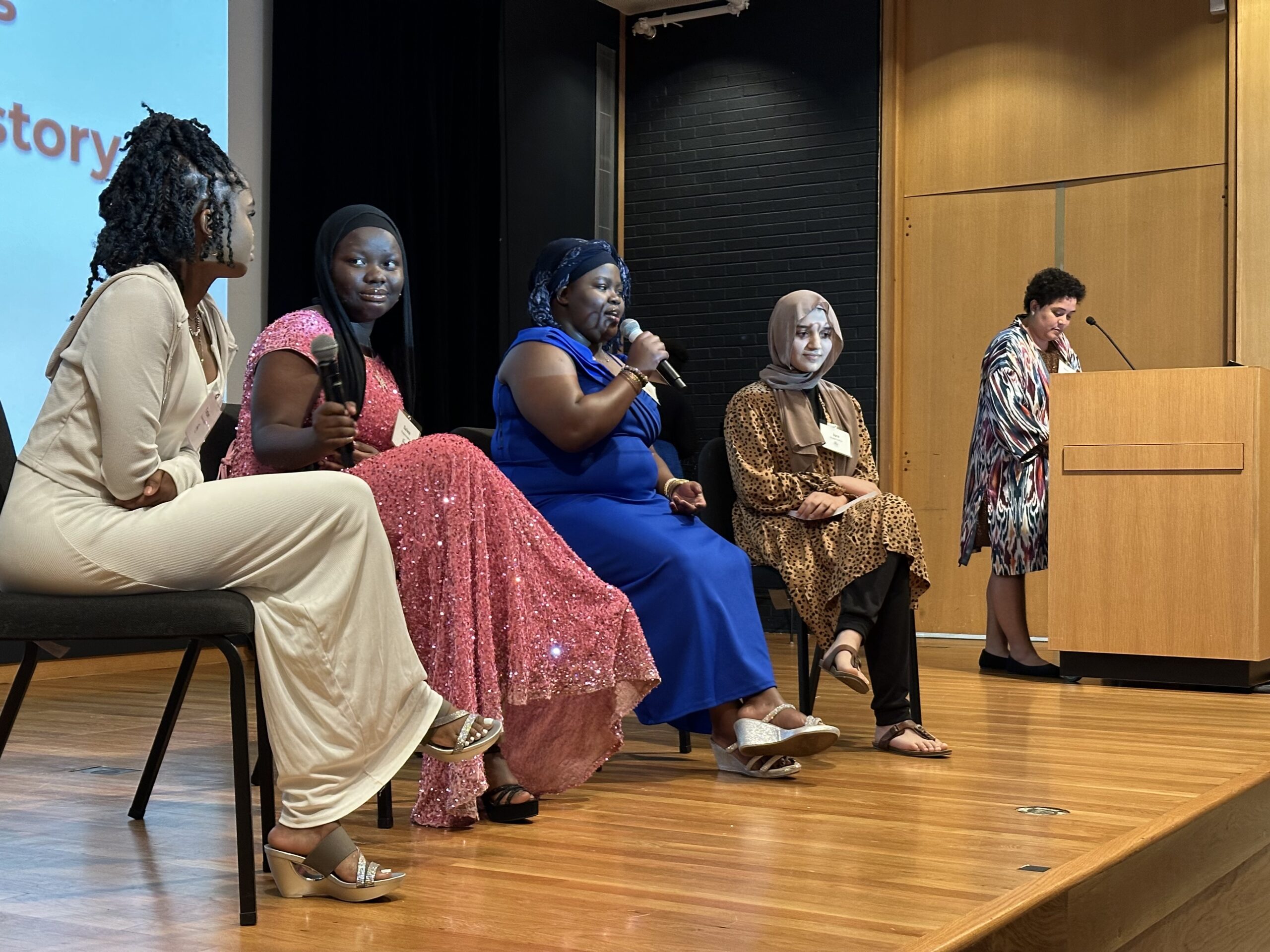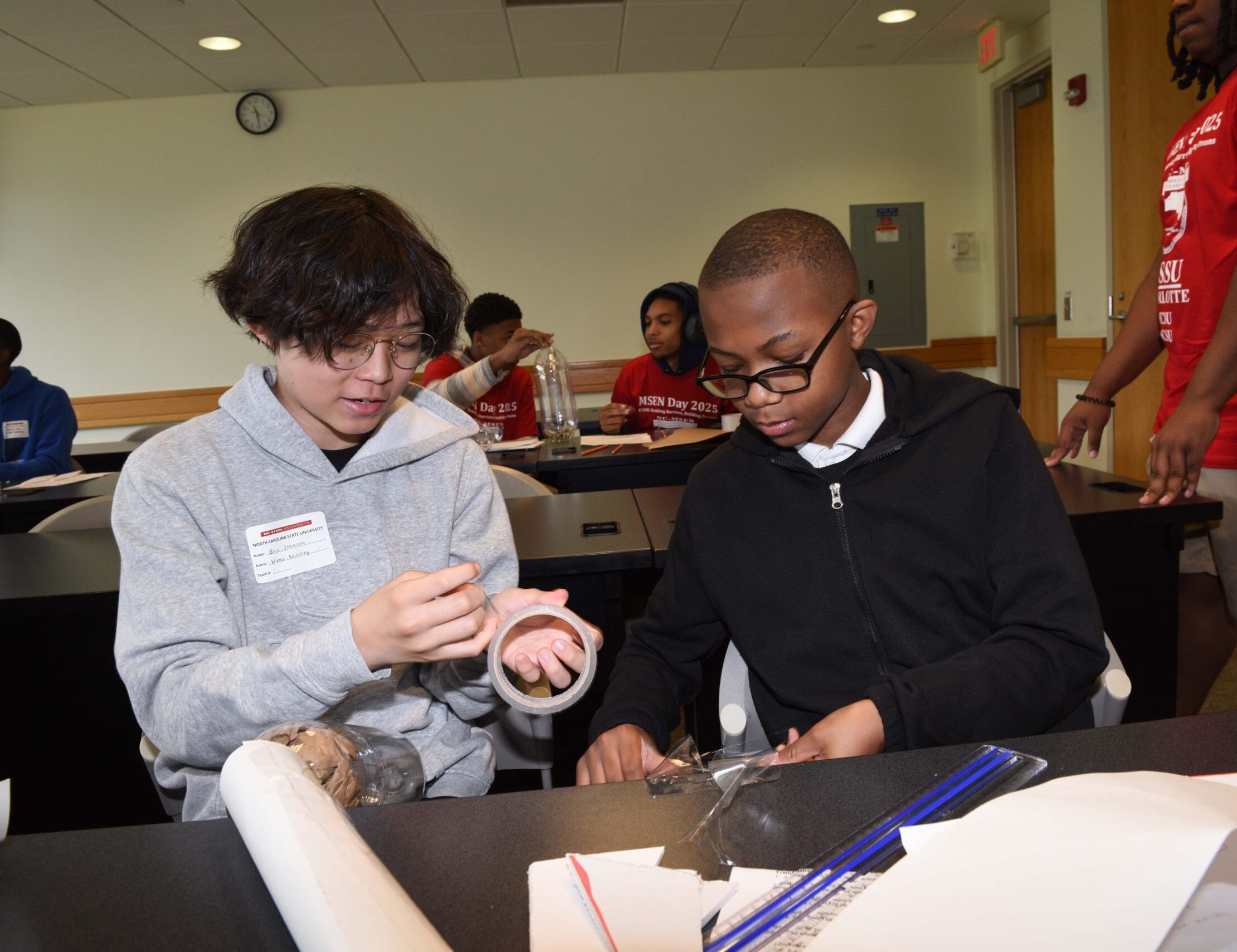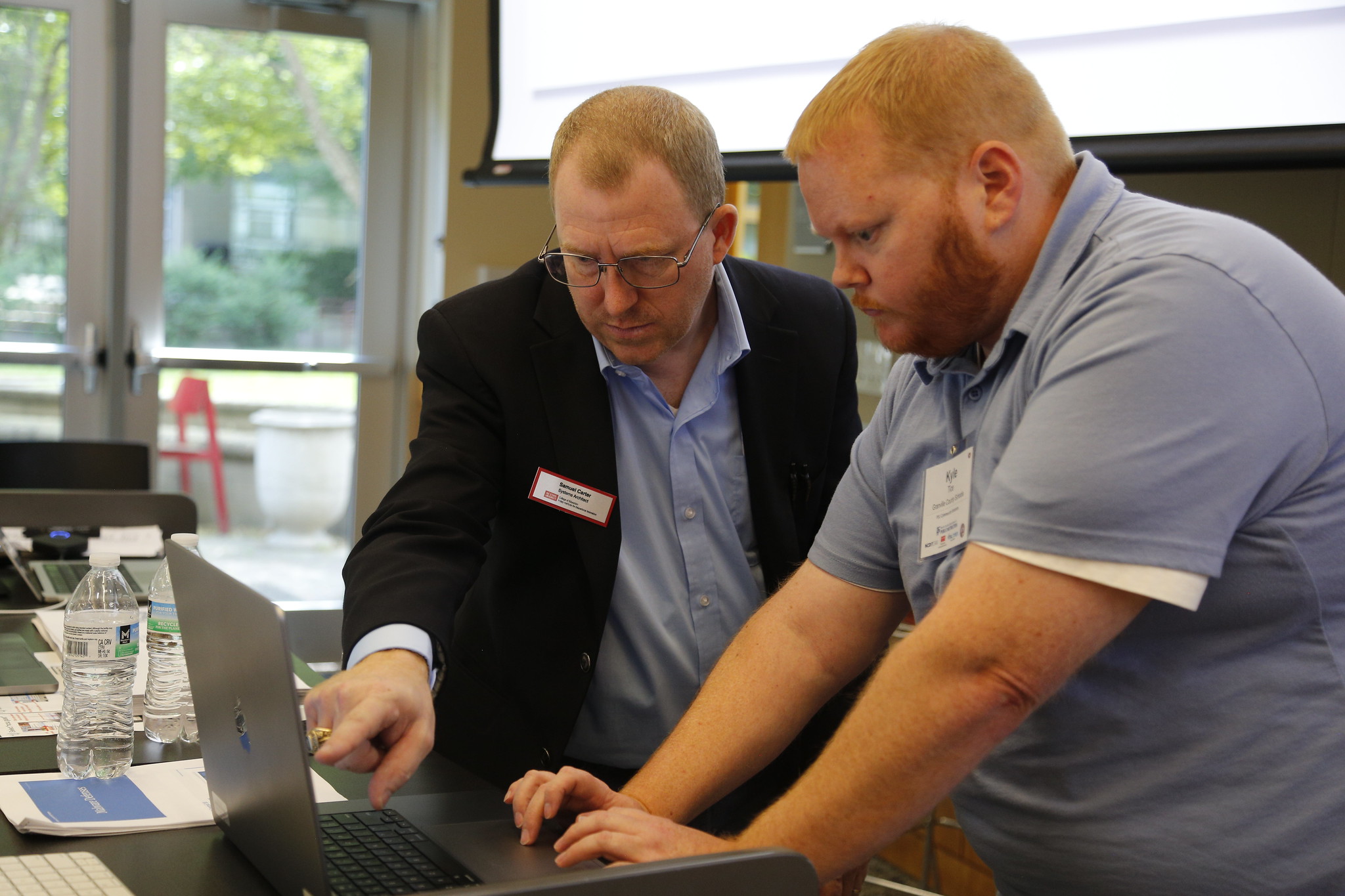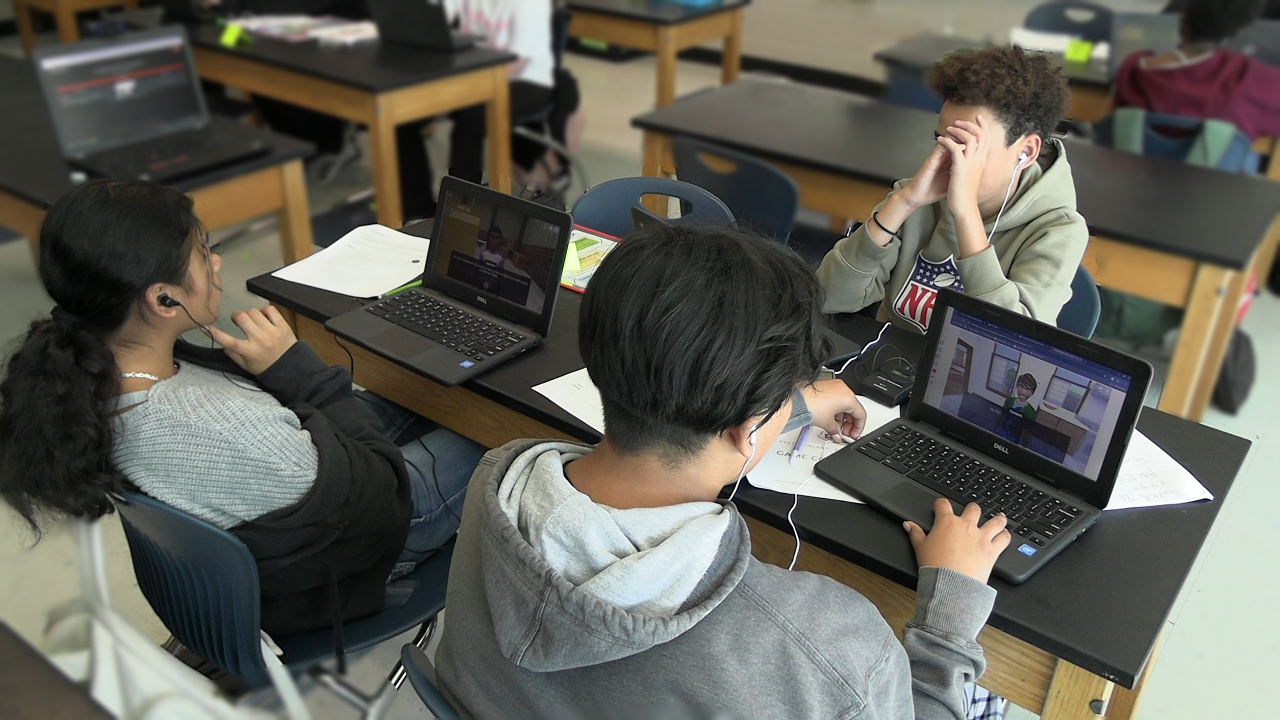Catalyst Grant Symposium Highlights Grants Supporting Literacy Research, Graduate Students’ Self Efficacy in Interdisciplinary Education

In 2018, Crystal Lee and Jose Picart received funds from the first round of Catalyst Grants to start the Literacy and Community Initiative (LCI), a program that partners with community-based organizations to examine, support and promote the power of youth voices. Since then, the program team has engaged over 160 students in more than 260 hours of literacy instruction and community engagement, creating over 600 written pieces and 10 self-published books. This year, with the support of a second Catalyst Grant from the Friday Institute for Educational Innovation and the NC State College of Education, LCI led a yearlong trauma-informed writing and art program for 19 adolescent refugee students.
“One thing I really appreciate about these Catalyst Grants…I think in some ways the Friday Institute gets synonymously associated with STEM and I appreciate, particularly today, hearing all the divergent and diverse ways that our work takes shape,” said Krista Glazewski, executive director of the Friday Institute and associate dean for translational research in the College of Education, during the Catalyst Grant Symposium Oct. 3. “Literacy is a big part of the work that we do. I love seeing that showcased, and I love seeing the two different angles and the different versions that we see out of today’s presentations as well.”
The Friday Institute for Educational Innovation and NC State’s College of Education have provided funding for more than 20 research projects through Catalyst Grants for the last six years to support collaborative research projects between faculty and staff of the two groups and aid research that could lead to further inquiry and support.
This year’s Catalyst Grant projects examined trauma-informed approaches to art-based literacy practices with refugee youth, early elementary-grade teachers’ equitable implementation of the Science of Reading and graduate students’ academic identity and self-efficacy.
Learn more about the three projects below.
Creating Hopeful Futures: Trauma-Informed Approaches to Art-Based Literacy Practices with Refugee Youth
Through the support of a Catalyst Grant, LCI facilitated 27 hours of literacy instruction through an art therapy and writing program for 19 refugee youth from Refugee Hope Partners, a holistic nonprofit for resettled refugee students and families. LCI also aimed to research what stories refugee youth chose to write, how they would use art and writing to create and how trauma-informed art approaches to literacy practices impacted social-emotional well-being.
In addition to the long-standing LCI team led by Crystal Lee, associate professor of English language arts education in the College of Education and faculty fellow at the Friday Institute, and Jose Picart, a professor of counselor education in the College of Education and deputy director at the Friday Institute, Angela Wiseman, associate professor of literacy education in the College of Education, worked with the team to uplift the visual methods of the program and guide the trauma-informed artwork practices. During the team’s research conducted through surveys, artifacts and interviews, their preliminary findings showed that these practices would end up reflecting self identification, relationships and connections, personal development, experiences and challenges of the students.
“We definitely see the potential for arts-based community programs with a trauma-informed component to encourage youth engagement and action,” said Wiseman. “When I really reflect on these findings, it’s the notion of brave spaces. Brave spaces include supportive communities where they’re able to explore issues around social justice, thinking about how participants can show vulnerability, perspective taking, face their fears, think and engage critically and examine their own intentions and really explore their sense of self.”
Early Elementary-Grade Teachers’ Equitable Implementation of the Science of Reading
Since the 1990s, stagnant and demographically disproportionate scores on standardized student reading assessments have motivated investment in improving reading instruction. The Science of Reading (SoR) movement is a nationwide endeavor aimed at promoting evidence-based reading instruction rooted in scientific research on how children learn to read. North Carolina has been at the forefront of the SoR movement, prioritizing the improvement of students’ reading outcomes and fostering equitable and effective literacy instruction among teachers. This project team aimed to investigate the extent to which first through third grade teachers in North Carolina engage in equitable implementation of the SoR in their literacy instruction, identifying barriers and facilitators in the pursuit of equitable implementation of the SoR and exploring the impact of professional development experiences on teachers’ equitable implementation of the SoR in their English language arts (ELA) and reading instruction.
The project team, composed of Jackie Relyea, assistant professor of literacy education in the College of Education; Dennis Davis, associate professor of literacy education in the College of Education; Jill Grifenhagen, associate professor of literacy education in the College of Education; and Marie Himes, research scholar and director of the New Literacies Collaborative at the Friday Institute, conducted two studies to address their interests in the equitable implementation of the SoR and the training of educators in Language Essentials for Teachers of Reading and Spelling (LETRS).
After surveying 331 K-5 North Carolina teachers, the researchers conducted follow-up interviews with 14 of those teachers. Themes from those two data methods revealed that educators believed that training evolved and/or reinforced their knowledge and instructional practices and that while they felt most confident in constrained skills such as phonics, they had the least confidence in unconstrained skills such as reading comprehension. Educators also expressed the need for more help in reading instruction for students with dyslexia and multilingual learners. The team hopes these findings could guide future professional development content for teachers implementing the SoR.
Graduate Students’ Academic Identity and Self-Efficacy for Interdisciplinary Graduate Education
The composition of research teams is rapidly evolving, and researchers from different fields often work together to understand and address problems from multiple perspectives. Students on these research teams should have both disciplinary depth as well as interdisciplinary skills to work with a wide range of researchers and stakeholders. In this study, the project team identified essential constructs related to graduate students’ academic identity, self-efficacy and sense of imposterism for interdisciplinary, transdisciplinary and convergent graduate research.
“We got interested in this topic because all of us bring different kinds of expertise, which is the fun part I think about being a Catalyst Grant,” said Gail Jones, Alumni Distinguished Graduate Professor in the College of Education and senior faculty fellow at the Friday Institute. “We are very interested because interdisciplinary instruction across campus is becoming more and more important…So we as a group are interested in understanding what it means to be in an interdisciplinary setting as a graduate student; what are those challenges you have and what are those experience and how can we actually measure them?”
The project team was also composed of Alicia Fischer, research associate at the Friday Institute, and Shiyan Jiang, associate professor of learning design and technology in the College of Education.
First, the team interviewed interdisciplinary research center directors to get their perspectives on what interdisciplinary research means to them, how they integrate graduate students in their work and how they support graduate student research identity development. Then, they created a valid and reliable survey based on themes from those interviews to measure academic self-efficacy, sense of belonging and imposterism. Next, the team surveyed 85 graduate students from STEM disciplines at various universities in the fall of 2023. Their findings from those student surveys suggested that having higher feelings of imposterism led to lower feelings of academic identity and sense of belonging, while students with lower feelings of imposterism had a statistically significant higher sense of belonging and academic self-concept. The project team believes that graduate students with a high level of imposterism and a lower sense of belonging may be at increased risk for dropout. These students may need additional academic support and opportunities. The project team hopes that this study can help educators and researchers better support graduate students in developing the skills and mindset needed to tackle complex, real-world problems through interdisciplinary and collaborative approaches, which they say are essential for fostering innovation.
- Categories:


